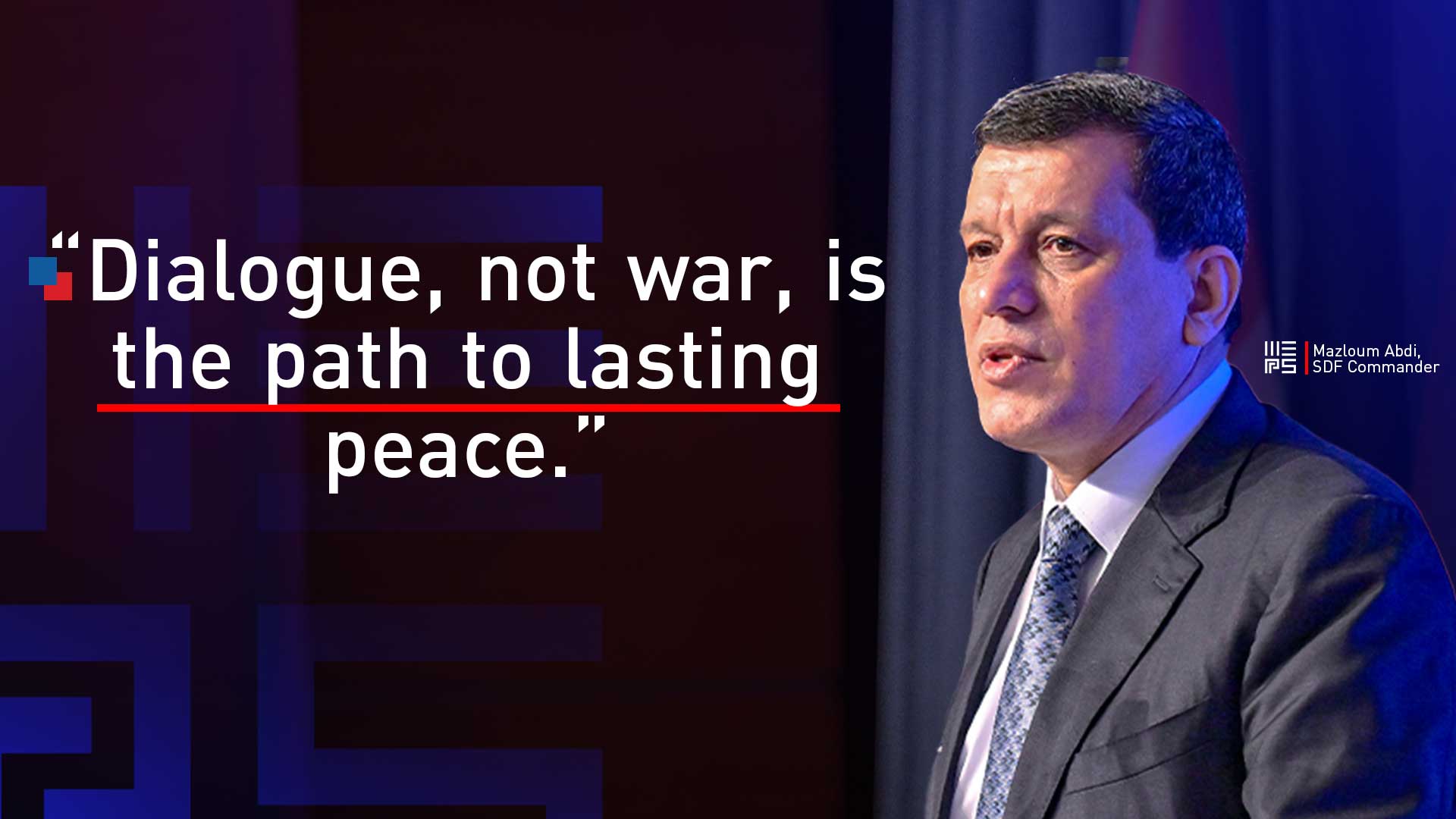SDF Commander Mazloum Abdi Calls for Dialogue, Decentralization, and Kurdish Rights at MEPS 2025
Speaking at MEPS 2025 in Duhok, Abdi stresses dialogue over conflict, highlights the March 10 agreement, and urges recognition of Kurdish rights in Syria.

ERBIL (Kurdistan24) — Mazloum Abdi, General Commander of the Syrian Democratic Forces (SDF), delivered a key address on Wednesday, November 19, at the sixth Middle East Peace and Security Forum (MEPS 2025) in Duhok, focusing on Syria, West of Kurdistan 'Rojava', and prospects for peace in the region. The forum, hosted by Kurdistan Region Prime Minister Masrour Barzani, brought together senior Kurdish, Iraqi, and international officials.
Abdi opened his speech by expressing gratitude to PM Barzani and the MEPS organizers for the invitation and the warm reception. “We were received with great warmth,” he said, emphasizing that the outcomes and commitments of MEPS 2025 could contribute to resolving regional crises and advancing sustainable peace.
March 10 Agreement: Halting Conflict and Protecting Communities
A major focus of Abdi’s remarks was the March 10 agreement between the SDF and the Syrian government led by President Ahmed Shar’a. He described the deal as a turning point that prevented further escalation during Syria’s recent conflicts:
“This agreement stopped many potential crises. We were in the midst of a difficult war, but the March 10 deal halted the fighting. It also prevented the fragmentation of Syria and stopped attempts to divide governorates,” Abdi said.
He stressed that for the first time in over 100 years, Kurdish rights were explicitly recognized in a formal political framework.
“Previously, the Kurdish issue was ignored. Now, the March 10 agreement clearly addresses it. The rights of Kurds and all Syrian communities must be guaranteed in a new constitutional framework,” Abdi said.
Dialogue and Decentralization as a Path Forward
Abdi called for a decentralized Syria where regions govern themselves. “After 15 years of war, Syria must become a decentralized state, with each region managing its own affairs. This is the reality we face, and we must work within this framework,” he said.
He also highlighted Kurdish communities in Aleppo, insisting that if political will exists, regional disputes can be resolved peacefully.
Reiterating the SDF’s commitment to negotiation, Abdi stated: “We have spent a long time at war. Every war ends in dialogue. Even if you achieve military success, dialogue is necessary. Problems cannot be solved through conflict alone.”
He explained that the SDF only fought when necessary to defend communities, and now prioritizes dialogue.
“From the start of the Syrian uprising, we did not seek war. We only acted in self-defense. Today, dialogue is our chosen path—and this applies to all Syrians, because conflicts alone cannot resolve our problems.”
Support for Peace Processes in Northern Syria and Türkiye
Abdi reaffirmed the SDF’s support for ongoing peace process in Türkiye. “We will do everything in our power to advance these efforts,” he said.
He praised the Kurdistan Region for its 15 years of support for West of Kurdistan, particularly the backing of President Masoud Barzani, noting that this support has strengthened dialogue between the SDF and the Syrian government.
He also highlighted the support of the Kurdistan Region people and the Peshmerga in defeating ISIS, emphasizing that this cooperation was key to dismantling the terrorist organization.
Addressing regional tensions, Abdi stressed that Türkiye should not view the SDF as a threat. “SDF should not be seen as a source of fear,” he said, calling for constructive engagement and dialogue.
MEPS 2025 continues in Duhok with further sessions examining Syria, the Kurdistan Region, Iraq, and broader regional security, offering a platform for senior political, academic, and diplomatic leaders to discuss long-term peace and stability in the Middle East.
Organized annually at the American University of Kurdistan in Duhok province, in the Kurdistan Region, the forum attracts heads of state, prime ministers, ministers, diplomats, global experts, policymakers, academics, and business leaders from around the world.
The conference is known for its open, in-depth discussions on regional stability, counterterrorism coordination, economic diversification, climate challenges, energy transitions, and the future of partnerships across the Middle East.